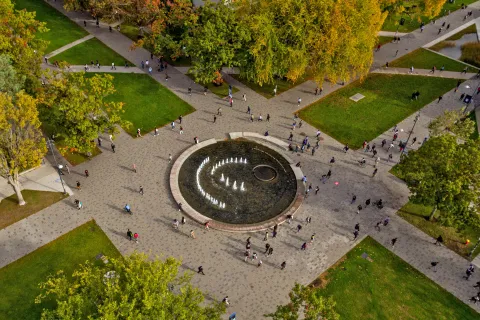UBC Engineering-led Research Excellence Clusters announced

Five Research Excellence Clusters led by UBC Engineering faculty members have been awarded funding through UBC’s Grants for Catalyzing Research Clusters (GCRC) competition.
The competition aims to foster collaboration at the university’s Vancouver campus by supporting the creation of “networks of researchers spanning multiple disciplines at UBC who form and nurture interdisciplinary teams”.
These teams are expected to launch research initiatives that “address key societal and cultural problems [and] solve challenges that transcend traditional boundaries”, among other goals.
This year, the competition will support 40 research excellence clusters, both established and emerging. The key faculty members in established clusters, which can be awarded up to $200,000, are already leaders in their field and have a long history of collaboration. Those in emerging clusters, which can be awarded up to $100,000, are emerging leaders with a more limited collaborative history.
Research Excellence Clusters advance key parts of the strategic plans of both UBC (“Shaping UBC’s Next Century”) and the UBC Faculty of Applied Science ("Transforming Tomorrow"). The UBC Engineering-led Research Excellence Clusters are:
Established Clusters
Bionics Network
Bionics Network research combines nature and technology to improve quality of life. We align materials within injured spinal cords to guide axon regrowth; develop implantable sensors; and give robots and prostheses a sense of touch. This is achieved by bringing together expertise in engineering, materials chemistry, biology, medicine, ethics and translation.
Cluster Lead: John Madden
Quantum Computing Research Cluster
Quantum computing is the next wave of fundamental science poised to revolutionize human experience. We want to discover and create the technology on which quantum computations will be run in the next two decades. The challenge is to produce a universal quantum computer that is demonstrably scalable and which also achieves a practical quantum advantage over classical computers.
Cluster Lead: Lukas Chrostowski
Emerging Clusters
Disaster Resilience Research Network
The UBC Disaster Resilience Research Network intends to build transdisciplinary connections and identify shared research goals to inform disaster risk reduction policy and decision making at community and governance levels. The cluster aims to advance multi-hazard assessment and mitigation in support of an inclusive and equitable development of just disaster risk management.
Cluster Lead: Carlos Molina Hutt
Immunotherapeutics
The goal is to develop a community focused on designing and developing next generation immunotherapeutics to promote health and prevent and treat disease. We will create a research-to-practice continuum that facilitates this process by linking basic researchers with clinical disease specialists, industry partners and health-care policy experts.
Cluster Leads: Kelly McNagny and Pauline Johnson
Trustworthiness of Machine-Learning-Based Systems
TrustML facilitates development of trustworthy machine-learning-based systems, i.e., systems that are reliable, secure, explainable, and ethical. The cluster will examine trust-related requirements in several life-critical domains, including medicine and aerospace, and will investigate solutions for building trustworthy systems that professionals and the general public can reliably adopt.
Cluster Lead: Julia Rubin
For more information about the Research Excellence Clusters, please see the announcement on the website of UBC's Office of the Vice-President Research and Innovation.


